Oncobesity News Posts

Can Ozempic Cure Addiction?
GLP-1 drugs, which have helped some people curb drug and alcohol use, may unlock a pathway to moderation.
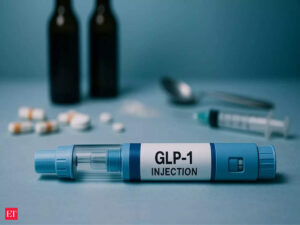
Hims says it will stop selling GLP-1 pill, after legal pressure from US
The telehealth company Hims & Hers said it will no longer sell a compounded version of Novo Nordisk’s Wegovy pill, just days after announcing the new product.
The move comes after Novo, which launched its …

You’ve reached your weight loss goal on GLP-1 medications. What now?
GLP-1 drugs have ushered in a new era in weight loss.

The Hims vs. Novo showdown; Pfizer’s monthly GLP-1 data; Q4 earnings roundup; and more
Welcome back to another edition of Endpoints Weekly! It’s Super Bowl weekend with the Patriots and Seahawks fighting for the championship. While our many Boston-area readers are surely excited, most of us here in New …

STAT+: HHS asks Justice Department to probe Hims & Hers over its cheaper compounded version of Wegovy
FDA will take “decisive steps” to thwart companies from mass marketing unapproved, compounded versions of GLP-1 drugs

US calls for DOJ investigation of Hims over GLP-1 drugs
The US government said it will refer telehealth and GLP-1 company Hims & Hers to the Department of Justice for investigation, following the company’s controversial launch of a compounded version of Novo …

Synergizing global clinical trials data: GLP-1 receptor agonist safety and novel clinical applications
A research team led by the Department of Medicine, under the School of Clinical Medicine, LKS Faculty of Medicine of the University of Hong Kong (HKUMed), has synergized the impacts of worldwide clinical trial data through a series of meta-analyses on GLP‑1 receptor agonists, an emerging cardiometabolic drug, offering in-depth insights into its safety profile and novel therapeutic potential in treating cardiovascular diseases.

Use of GLP-1 Drugs Under Scrutiny at Winter Olympics
(MedPage Today) — As the Winter Olympic Games get underway, the World Anti-Doping Agency (WADA) is monitoring an unexpected class of drugs: GLP-1 receptor agonists.
An advisory group that makes recommendations about WADA’s list of prohibited…

STAT+: Pharmalittle: We’re reading about TrumpRx, Hims & Hers selling compounded Wegovy, and more
President Trump on Thursday night launched TrumpRx, the website he and his aides have touted as a platform aimed at lowering drug prices

STAT+: IPOs, GLP-1s, and challenges with a gene therapy
And other biotech news brought to you by The Readout

Makary Blasts ‘Illegal Copycat Drugs’ as Hims Launches Compounded Wegovy Pill
Novo Nordisk has also spoken out strongly against Hims & Hers’ compounded Wegovy pill, with CEO Maziar Mike Doustdar telling investors the knockoff version is a waste of money.
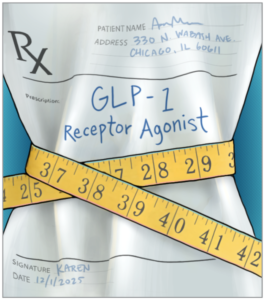
Post-Hoc Live: Analyzing the Novo vs. Hims GLP-1 showdown
I’ve been waiting for the big showdown between drugmakers and compounders for months, and it’s finally here.
Today on Post-Hoc Live at 12 p.m. ET, we’ll be talking about telehealth company Hims & Hers’ plan …

Obesity Space Abuzz With Oral, Amylin Assets as Momentum Rides Into 2026
Biopharma’s obsession with the weight loss sector—projected to exceed $130 billion in revenue by 2035—shows no signs of slowing down as analysts gear up for a year that will test the oral market and provide key data on novel mechanisms.

FDA chief Makary takes aim at Hims’ compounded Wegovy pill plans
FDA Commissioner Marty Makary took a not-so-subtle swipe at Hims & Hers in a social media post Thursday, saying his agency would “take swift action against companies mass-marketing illegal copycat drugs.”
Without naming Hims, Makary’ …

2026 GLP-1 Super Bowl Commercials May Be Game Changers for Weight Loss Drugs
New GLP-1 ads, like telehealth provider Ro’s new campaign featuring tennis icon Serena Williams, aim to shift the conversation about weight loss drugs.
This year, the Super Bowl will feature advertising of GLP-1 drugs in new ways.
Telehealth provider Ro is using tennis star Serena Williams to help break down stigma.

Novo’s threat to sue Hims over Wegovy pill faces legal hurdle
Novo Nordisk’s threatened legal action against Hims & Hers for selling a compounded version of the pharma giant’s newly launched Wegovy pill may be far from a slam-dunk win.
Dae Lee, an attorney at Buchanan …
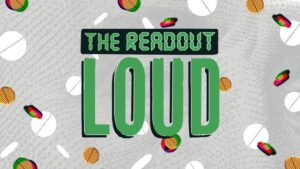
Challenges for a crucial sickle cell treatment and the latest outlook for GLP-1s
This week on “The Readout LOUD”: We discuss financial outlooks from Novo Nordisk and Eli Lilly, a closer look at why manufacturing problems have slowed the rollout of a crucial…

STAT+: Novo Nordisk accuses Hims & Hers of ‘illegal mass compounding’ over a cheaper version of Wegovy pill
Hims & Hers is making available a cheaper, compounded version of the Wegovy weight loss pill sold by Novo Nordisk, prompting the drugmaker to accuse the telehealth platform of “illegal…

Hims & Hers Launches Copy of Wegovy Pill, Prompting Legal Threats
(MedPage Today) — Telehealth company Hims & Hers said Thursday it will launch a cheaper, off-brand version of the weight-loss pill semaglutide (Wegovy), just weeks after drugmaker Novo Nordisk launched its highly anticipated reformulation…

Novo Nordisk vows legal action to protect Wegovy pill
Novo Nordisk said Thursday it would take legal action against a US chain offering a copycat of the new pill version of its Wegovy weight-loss drug.

GLP-1s and the Super Bowl
The Super Bowl is once again getting the GLP-1 ad treatment.
Hims & Hers is back with another combative spot that calls out the disparities in healthcare experiences between the …

Big Pharma’s most valuable up-and-coming GLP-1s
Late-stage GLP-1 candidates from Eli Lilly, Novo Nordisk and Amgen have a combined net present value of $68 billion.

Lilly Axes Three Therapies Amid Pipeline-in-a-Product Push for GLP-1
One of the assets shelved by Eli Lilly is a gene therapy for dementia, which it obtained in its $1.04-billion acquisition of Prevail Therapeutics in late 2020.

A sneak peek of pharma’s Super Bowl ads: GLP-1s, tight ends, and more
What drug ads will air during Sunday’s Super Bowl? STATus Report host Alex Hogan and reporter at large Damian Garde have a rundown of what to expect.

Semaglutide improves cardiovascular health but price reductions are needed to make it cost-effective, study finds
Semaglutide, the active ingredient in the weight-loss medications Ozempic and Wegovy, offers substantial cardiovascular benefits for selected patients without diabetes who have established heart disease, but further price reductions are needed to make the therapy good value for money, according to a new analysis from researchers at Beth Israel Deaconess Medical Center (BIDMC).

Lilly Eyes Pipeline in a Product as GLP-1s Move Into I&I
In addition to claiming revenue of $19.3 billion for the fourth quarter, Eli Lilly executives offered a glimpse into their strategy to expand their GLP-1 franchise into the immunology and inflammation space, with trials currently underway in asthma, psoriatic arthritis, Crohn’s disease and ulcerative colitis.

GLP-1 ‘Agonorexia’; Psychotic Disorders Rising in Young People; Pink Noise Pitfalls
(MedPage Today) — Clinicians are seeing more cases of “agonorexia,” when use of GLP-1 receptor agonists turns into disordered eating. (New York Post)
Colorado could become the first state to use ibogaine, a plant-based psychoactive compound…

Novo’s Wegovy Pill Success Is ‘Good News’ for Orforglipron, Lilly Execs Say
Novo Nordisk and Eli Lilly both think the Wegovy pill is doing well, but the American rival sees the successful launch as a harbinger of good news for its own candidate, orforglipron, which is expected to hit the market in the second quarter.
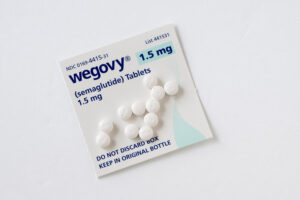
Wegovy pill in high demand weeks after launch, Novo Nordisk says
Novo Nordisk said Wednesday that demand for its Wegovy pill got off to a strong start after it launched in the U.S. in early January
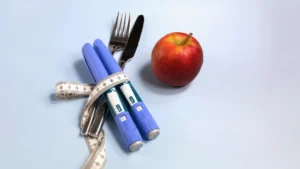
The overlooked nutrition risk of Ozempic and Wegovy
Popular weight-loss drugs like Ozempic and Wegovy can dramatically curb appetite, but experts warn many users are flying blind when it comes to nutrition. New research suggests people taking these medications may not be getting enough guidance on protein, vitamins, and overall diet quality, increasing the risk of muscle loss and nutrient deficiencies.

Novo Goes ‘All In’ on Wegovy Pill but Analysts Worry It’s Not Enough
Novo Nordisk CEO Maziar Mike Doustdar acknowledged the market pressure facing the company’s GLP-1 products but sought to assure investors that Novo has the situation under control.

GSK Says No to GLP-1s, Prioritizes ‘Downstream Effects’ of Obesity
Instead of joining the increasingly crowded GLP-1 arena, GSK will focus its efforts downstream of obesity—a push currently anchored by its Phase III-ready FGF21 analog efimosfermin alfa for liver fibrosis.

Wegovy pill: How does it compare to injections and what are the side effects?

Weight Loss: What I Wish I’d Known Before Taking Compounded Semaglutide
Semaglutide erased the constant mental chatter about food that had ruled her life, but along with it went her awareness of basic needs.
Writer Kristen Reed shares her weight loss journey with compounded semaglutide. Photography courtesy of Kristen Reed
Health and wellness touch everyone’s life differently. This is one person’s story. The views and opinions expressed are those of the speaker and do not necessarily reflect the views or positions of Healthline Media.

FDA Approves Wegovy Weight Loss Pill: How It Compares to Injectables
The Food and Drug Administration (FDA) recently approved a tablet version of the GLP-1 drug Wegovy for weight loss. Image courtesy of Novo Nordisk
Novo Nordisk officials said a new pill version of its weight loss drug Wegovy is now available in the United States.
The Food and Drug Administration recently approved the Wegovy tablet as a prescription treatment for obesity and weight management.

Stopping GLP-1s May Lead to Weight Regain In Less Than 2 Years, Review Finds
Research shows that people who stop taking GLP-1 medications regain weight within 2 years. Image Credit: Tatsiana Volkava/Getty Images
A new study has found that people regain weight within 2 years of stopping a GLP-1 drug.
Metabolic improvements also tend to fade within that time, researchers found.
Experts advise that slowly tapering off the medication is better than quitting abruptly.

Tirzepatide, Hormone Therapy May Aid Weight Loss After Menopause
A combination of hormone therapy and the GLP-1 drug tirzepatide may promote weight loss in postmenopausal females. Image Credit: Mauro Grigollo/Stocksy
A new study found that postmenopausal females who use hormone therapy in combination with tirzepatide experience greater weight loss compared to those who don’t.
Tirzepatide (Zepbound) is an FDA-approved medication prescribed for weight loss. It’s also the active ingredient in the GLP-1 medication Mounjaro to treat type 2 diabetes.

Oral Semaglutide Lowers Heart Failure Risk in People with Type 2 Diabetes
Emerging evidence suggests that oral semaglutide may reduce the risk of heart failure–related events in people with type 2 diabetes. JasonDoiy/Getty Images
Oral semaglutide may reduce heart failure events in high-risk individuals with type 2 diabetes.
The benefit appeared strongest among those with a common but hard-to-treat form of heart failure.
Type 2 diabetes and heart disease often co-occur and the findings could pave the way for new treatments.

Lilly’s GLP-1s Mounjaro, Zepbound Push Revenue Up 46% in Q4
Mounjaro and Zepbound combined for $11.7 billion in the fourth quarter, which beat analyst consensus of $10.6 billion.

Embattled Novo Nordisk considers buying a monthly GLP-1 to bolster portfolio
Novo Nordisk is looking into acquiring or developing a long-acting GLP-1 drug that could compete with Pfizer’s monthly obesity shot.
Pfizer beat Novo in the ferocious battle to acquire …
